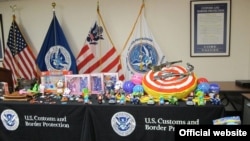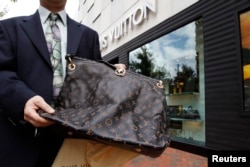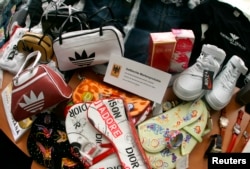A memorandum was signed by U.S. President Donald Trump on Wednesday to combat the sale of bogus products through online platforms such as Alibaba, Amazon and eBay.
"This president has decided it's time to clean up this wild west of counterfeiting and trafficking," said Peter Navarro, assistant to the president and director of the Office of Trade and Manufacturing Policy.
Although Trump's move takes no immediate action against makers and sellers of fake products — ranging from pharmaceutical drugs to brand-name athletic shoes — it does direct the Department of Homeland Security to coordinate with the Attorney General, the U.S. Trade Representative and the Commerce Department, as well as other federal agencies, to jointly investigate the problem and submit a report with recommendations within 210 days.
"We simply don't know how much counterfeiting is going on," according to Navarro.
Speaking to reporters on a conference call Wednesday, Navarro estimated that up to half of the branded goods online are fake.
Customs and Border Protection does not have enough personnel to properly police the flood of illicit goods, including dangerous opioids, pouring into the United States via online sellers, according to Navarro.
"If you don't clean it up, the government will," Navarro warned the online platforms, which he says are responsible for selling an estimated half-trillion dollars' worth of counterfeit products annually.
The frequently seized imported fakes are items of footwear, followed by clothing, leather goods and IT equipment, according to a survey of customs officials in numerous countries. Postal parcels are the most popular way to ship counterfeit and pirated products.
Besides cheating consumers out of billions of dollars, Navarro says the illicit products pose a national security threat because they are slipping into the military supply chain.
In a statement, the top online U.S. retailer, Amazon, said it “invests heavily in proactive measures to prevent counterfeit goods from ever reaching our store.”
Alibaba, the world’s most popular destination for online shopping, says it has “developed best-in-class systems to protect IP and battle the scourge of counterfeiting.” The Chinese company adds that it welcomes the initiative "and the attention it brings to the global fight against counterfeiting."
China is the top producer of fake goods in nine out of 10 categories, including the most popular category, footwear, where as much as 27 percent of all goods seized could be traced back to the country, according to a report by the Organization for Economic Cooperation and Development (OECD) and the European Union's intellectual property (EUIPO).
Asked by a reporter if this has been raised during ongoing U.S.-China trade talks, Navarro responded, "There's no relation of this to that."







